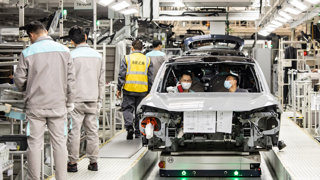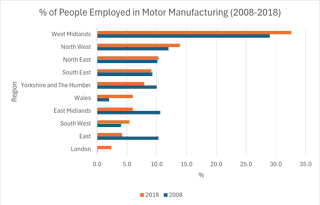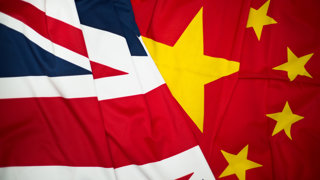Introduction
In July 2025, the BBC reported that 1 in 10 new cars bought in the UK were made in China. This shows how quickly Chinese car brands, such as MG, BYD and GYM Ora, are becoming more popular in the UK. These companies sell vehicles which are competitively priced, well-equipped and meet the demands of modern life, making them attractive to many consumers.
The demand is growing so fast that in October 2025, BYD reported an 880% increase in sales in just a year, between September 2024 and September 2025.
This raises a good question: are these imports a way of improving access to more affordable goods and therefore improving social mobility, or could it create economic and environmental problems for the UK and the rest of the globe in the future?

Opportunities
The car industry brings employment opportunities to the UK. According to Statista, 813,000 people were employed in the automobile industry in 2023; this was a 4.2% increase from the previous year, and overall employment in this industry has been slowly rising since 2021.
Nearly half of all car manufacturing employment in the UK is in the West Midlands. This is important because this region suffered heavy deindustrialisation in the late 20th century when old industries, like textiles and metalworking, declined leaving many people unemployed.

Today, car companies provide jobs that can be adopted by the other workforces and offer apprenticeships to train young people in areas of the business such as technicians and mechanics. This helps to reduce the negative impacts of past deindustrialisation by bringing new employment and skills back into the area.
Chinese car brands are entering the UK market at a lower price compared to the more traditional European brands. For example, Auto Express compared family plug-in hybrid cars - the Volkswagen Tiguan eHybrid Match with a BYD Seal U.
The Volkswagen performed slightly better overall, but the BYD was over £7,500 cheaper, suggesting that it offers excellent value for money for consumers.
Chinese brands also bring new technology and more electric vehicle (EV) options to the UK. This increases competition and challenges well-known brands to stay competitive on quality and price. As a result, UK consumers may benefit from cheaper prices, more choice and faster access to new electric car technology.
Challenges
Although there is a well-established car manufacturing industry in the UK, no Chinese car brand is currently made there. The increased availability of Chinese cars in the UK could have an impact on the number of cars being manufactured in the UK and therefore threaten job security of those employed in that industry.
The political relationship between the UK and China is complex and can change quickly. If either country changes the terms of their trade deal (for example, if the UK increases tariffs on goods from China), there will be an impact on the cost and availability of imported cars. This in turn may increase demand and the price of the existing car market, out-pricing many consumers from a new car.

Given that many of the cars from China are fully electric or hybrid, there are growing concerns about whether the materials for the car batteries that run these cars (i.e. lithium and cobalt) are being sourced in an environmentally and ethically responsible way. For example, in 2021, between 60 and 70% of the world’s supply of cobalt was extracted from existing copper mines in the Democratic Republic of Congo. Many of these mines have limited regulations meaning that workers could be exploited and there is a risk of water contamination and habitat destruction.
Overall, the influx of more affordable cars seems to benefit the consumer on a short-term basis which in turn can generates income for the government through taxes. However, like the cheaply manufactured goods which proceeded the car market, we may need to be mindful of any long-term or hidden issues with these new supply trends to ensure a more sustainable future.
Please see the downloadable article for data sources throughout the text.
Further reading
The Chinese electric cars you can buy today: more EV for less cash? Car Magazine, July 11, 2025.
Bad news for Tesla: Britain is going bonkers for Chinese cars. Business Insider, June 11, 2025.
Chinese car firm BYD is racing ahead with its electric vehicles. Here’s how more established brands can catch up. The Conversation, October 21, 2025.
File nameFiles
File type
Size
Download
